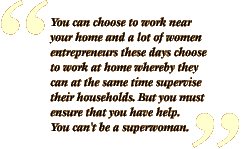
... continued from page one
You're also a member of the National Association of Women Entrepreneurs?
Veronica: Yes, and it is made up of a wonderful group of women who have proven themselves in industry. They are acting like mentors for women like myself who are still in the learning stage of doing big business. The networking within the group is tremendous.
We're not saying that we don't want men mentors but it appears that men are mentors to other men and for them where networking and mentoring are concerned, it is done very naturally. Where women are concerned our disadvantage is we don't have the men's 'buddy' system where after work they go for a drink or play golf together whereby a lot of business takes place.
How do you see the role of a woman in our society?
Veronica: I think our role has changed tremendously. We are not at the stage where we are fighting for rights anymore. We have already got them. This is where we have to make the distinction that we are not at basics anymore.
Yes, there are certain constitutional changes that still need to take place, like we want the Domestic Violence Act to be approved, we want the immigration laws to be changed. These are fundamentals that still need to be worked on and there are certain groups of women already doing that.
For the rest of us who are in business itself what we can do is act as role models. We are not what our mothers were. Today we have a different lifestyle, our family structure is different, our role at home as mothers is different. We have to plan. We cannot jeopardise one for another.
It is the role of a woman in a marriage, in a family, to do the planning. And as entrepreneurs we have a little bit more flexibility. That is why I recommend women to go into business for themselves. It makes them a better mother, wife, homemaker, when they run their own businesses.
How so?

Veronica: You have control of your own time and you have control over yourself. You don't have to work the normal 9-5 day. You can come in at 2 and work till 9 if you need to be at home in the morning. That gives you a lot of satisfaction that you are with your child if he needs you.
You can choose to work near your home and a lot of women entrepreneurs these days choose to work at home whereby they can at the same time supervise their households. But you must ensure that you have help. You can't be a superwoman. That's not going to work and you must tell yourself that you don't like to do certain things. I don't like to think I have to spend my weekends washing bathrooms so I plan for it, I put a budget and say I need help. Then you will find you are more in control of the whole situation.
This is an ideal concept but how near are we to attaining it?
Veronica: It is a growing trend but what women have to change is thinking that they have to live with a certain amount of security, like talking about a monthly income. They should be able to let go and be more adventurous. A lot of Asian women tend to hold on but I would advise them to do it as they would be able to carve a career for themselves and still be good mothers. I've done it and I'm doing fine.
So it is a choice of working for others or working for yourself?
Veronica: Yes. Not many companies allow you to work flexi-hours or provide child care services. So many professional women are leaving the workforce when they have to be full-time homemakers at least for a period of time and they are losing out. I would recommend these women while they are at home to find time to develop something in whatever areas of professionalism.
I have a friend who is a lawyer and who has given up her job because she has a new baby. She has clients for whom she prepares drafts and documents. She does a lot of paperwork at home rather than go to court. You can choose what you want to do.
I think women all over the world are realising that this is one method to unload them from further pressures. In the 80s we were trying to do everything and somewhere along the way we realised that we were losing out on our quality life. It's still happening but more are now opting for a better way of doing things.
How do men figure in this?
Veronica: That is also a changing trend. I think that the men in our lives these days respect the fact that we wish to have a career. They try, I stress `try', to be as cooperative as possible. Of course there are some men who are more involved in parenting and homemaking but they are the exceptions rather than the rule. The general rule is they are cornered.
Isn't that a lot of talk and no action from the men?
Veronica: Yes, they say I would like to help you but I'm tired. But there is definitely a changing trend, however it is a little slow and we are moving too fast.
So instead of saying that I'm going to wait for my husband to change or for someone to help me, which is going to frustrate me no end and I might just be over the hill before anything like that takes place. I might as well take control of the situation and say, I am expected to take care of the household, to be the mother to my child, and I still want my job so how am I going to plan this entire thing?
Sometimes it is we women ourselves. It is the mental make up that women have sometimes. We expect too much of ourselves, we want perfectly groomed children, a perfect home and we want to do all these ourselves. We've got to slowly let go and let others take over the situation. For example, most women can't bear leaving the dishes unwashed but somehow men can. So if they are willing to do it at their own pace let it go at that.
Do career women here still face sexual discrimination?
Veronica: I would say it is still rampant in the sense that it is the general view especially when you are in business. But again is slowly changing now. Most men don't really take women seriously as a force to be reckoned with. But I think that is an advantage because they let their guard down!
And I believe in being assertive but not aggressive. We have ladies who are absolutely aggressive and it turns the men off. It is also a trend among women managers to prepare themselves exceptionally well in case they are questioned on their ability. If they know their stuff they slowly gain the respect of their male counterparts.
How would you profile the single woman in our society?
Veronica : I'm talking about the urban ladies and they are definitely better educated. Most of them work for companies because their time is their own. I would highly recommend single women to work for companies to gain more experience and be more exposed.
What about their sexual relationships?
Veronica : Most of them are dating but unlike in the 70s and 80s very few actually cohabitate with their partners these days. They may have boyfriends but they choose to have their own households. Those who are professionals and in their 20s or early 30s are not ready to share their own space. They are financially independent and have their own cars, homes, investments. They don't want to get into relationships that will deprive them of what they already have unless there is something more to the relationship.
Women have realised that relationships are not where you build yourself on. This was what we used to do before. We depended on a relationship to further ourselves but when that relationship fell apart, then we fell apart. This is no longer what we all believe in. We build ourselves first so our relationships come and go. When he walks away, yes, you hurt, and there is an emotional trauma but your life isn't affected that much and you tend to bounce back faster. You tend to have better relationships, not dependent relationships where one party depends on the other.
I don't believe in dependent or independent relationships. If you are both independent then you don't need the relationship. But in inter-dependent relationships you start building an equal relationship. For example, if I am going out tonight you have to take care of dinner. I would do the same for you. We would both want to provide the comforts of a home for each other, a loving environment. It can be something that both parties can give.
Even a marriage now is a marriage of resources. I have my resources, and we combine them to have a better lifestyle. It is not so much that I need to have things from you any longer.
What about the divorcees? Are they handling their situation much better in today's society?
Veronica: What I have seen in divorces is ladies who have careers of their own are better off than those who are not working. For the latter, when the divorce does take place they are shattered because they are financially and emotionally dependant on their husbands so they don't handle the situation well. Then there is the bitterness that all their years invested in homemaking have come to nothing.
The career woman may be emotionally broken but she has responsibilities to her children, she has her job and it is easier for her to get over it. Even in terms of the break up itself it is less bitter for her.
The divorce rate is going up. Is it because it is more acceptable now to have a divorce?
Veronica: Yes, and also because people don't work so hard at their marriage anymore. A marriage is just a certification of a relationship. A relationship can exist without a certification. If one party is not putting in her fair share of emotion or time, or if the couple is not trying hard enough to understand each other, it will fall apart. So people get disillusioned and divorce after ten or more years of marriage as the spark has gone out of their relationship.
On the other hand a lot of marriages are staying together for a lot of other reasons. People just don't get divorced any more because there is no more love unless it becomes emotionally unbearable to live within that relationship. I've seen so many marriages which are actually functioning just based on companionship, joint resources. It would be too messy to go through a divorce what with the children responsibilities, mortgages. It would be a big strain on everybody. I see marriages existing just on those lines and if people are sensible it works.
the full story | back | top | main | next | other people | back to mir

